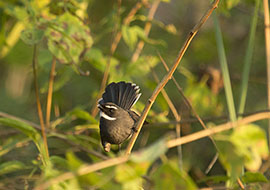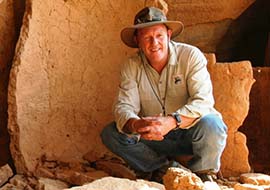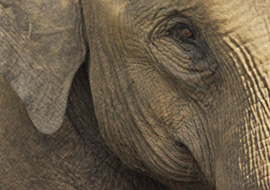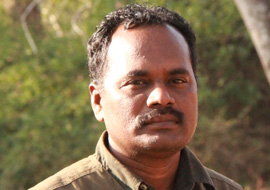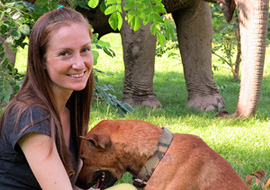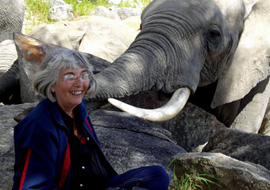Ami speaks about her very recent work with The Nature Conservancy and The Northern Rangelands Trust, where the focus was on the indigenous people of Northern Kenya and their efforts to end poaching on ancestral lands by preserving their traditional way of life and strengthening their communities.
- The Wild Walk Team


Last year, I began a story with The Nature Conservancy and
The Northern Rangelands Trust about indigenous communities uniting to combat poaching in Northern Kenya.
Commercial poaching organized by sophisticated heavily armed criminal networks and fueled by heavy demand from newly minted millionaires in emerging markets is devastating the amazing mega-fauna of the African plains. It is entirely possible, even likely, that if the current trajectory of death continues, rhinos, elephants and a host of lesser known plains animals will be functionally extinct in our lifetimes.
 Much needed attention has been focused on the plight of wildlife and the conflict between heavily armed poacher and increasingly militarized wildlife rangers. However, the compelling story of indigenous communities caught in the cross-hairs of the poaching wars, and who may hold the key to saving Africa's great animals, is largely untold.
Much needed attention has been focused on the plight of wildlife and the conflict between heavily armed poacher and increasingly militarized wildlife rangers. However, the compelling story of indigenous communities caught in the cross-hairs of the poaching wars, and who may hold the key to saving Africa's great animals, is largely untold.
 The vast arid landscape of savannah, thorn-scrub and forested sky islands is populated by 14 indigenous semi-nomadic ethnicities- Bajun, Boni, Borana, Giriama, Maasai, Ntorobo, Njemps, Ormoa, Pokomo, Pokot, Rendillie, Samburu, Somali, and Turkana. Healthy populations of elephants including some massive tuskers roam this region while endangered black rhino, Grevy's zebra and Hirola antelope hold on in globally significant numbers. But armed poachers taking advantage of the porous borders of Somalia, and South Sudan put wildlife and people at grave risk, increasing instability, inter-clan conflict, and lawlessness. While government and private conservation organizations fight to strengthen anti-poaching efforts, communal cohesion with and between communities is the fabric upon which conservation depend.
The vast arid landscape of savannah, thorn-scrub and forested sky islands is populated by 14 indigenous semi-nomadic ethnicities- Bajun, Boni, Borana, Giriama, Maasai, Ntorobo, Njemps, Ormoa, Pokomo, Pokot, Rendillie, Samburu, Somali, and Turkana. Healthy populations of elephants including some massive tuskers roam this region while endangered black rhino, Grevy's zebra and Hirola antelope hold on in globally significant numbers. But armed poachers taking advantage of the porous borders of Somalia, and South Sudan put wildlife and people at grave risk, increasing instability, inter-clan conflict, and lawlessness. While government and private conservation organizations fight to strengthen anti-poaching efforts, communal cohesion with and between communities is the fabric upon which conservation depend.
The Northern Rangelands Trust is a collective of twenty-six indigenous groups covering 2.5 million hectares of Northern Kenya. Through their efforts communities have begun to lay down their guns, relying on dialogue rather than warfare to settle inter-tribal conflict and collectively manage wildlife within their lands. They are beginning to reap the benefits of their efforts as both conservation and tourism dollars flows into this extremely poor region. By managing grazing jointly they can better safeguard against the unpredictability of drought and climate change. Poaching now threatens their recent successes and may rip apart fragile communities and permanently end a nomadic way of life. Their efforts to preserve community cohesion are ultimately the best immunization against forces that threaten their wildlife and their way of life.
 I am going back to continue work on these stories and deliver a series of intensive educational trainings in visual storytelling to the indigenous communities of the Northern Rangelands Trust. Developing the capacity of the people who are instrumental on the ground and closest to the stories can leave a lasting impact. Adding more community engagement and advocacy allows us to get their stories out and heard around the world.
I am going back to continue work on these stories and deliver a series of intensive educational trainings in visual storytelling to the indigenous communities of the Northern Rangelands Trust. Developing the capacity of the people who are instrumental on the ground and closest to the stories can leave a lasting impact. Adding more community engagement and advocacy allows us to get their stories out and heard around the world.
If you are interested in supporting the workshops, please get in touch with Ami Vitale at info@amivitale.com. Your contributions will go back into these communities and these majestic creatures. You can also help by contributing directly to the powerful work of Northern Rangelands Trust and The Nature Conservancy in Africa who fight everyday to protect the natural world we all share. A visit to these links - www.nrt-kenya.org and www.Nature.org would be very resourceful.



